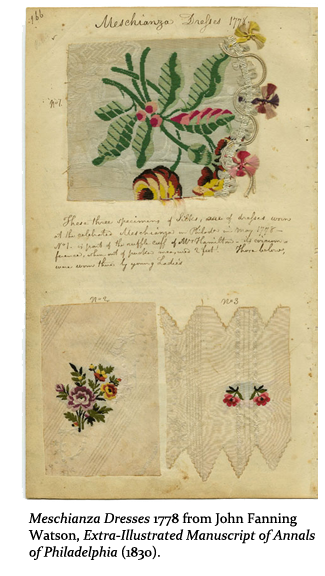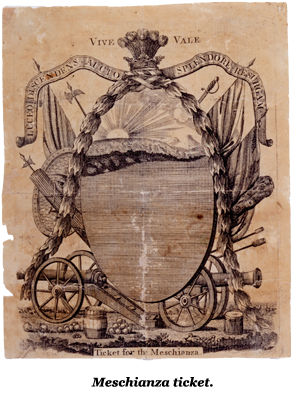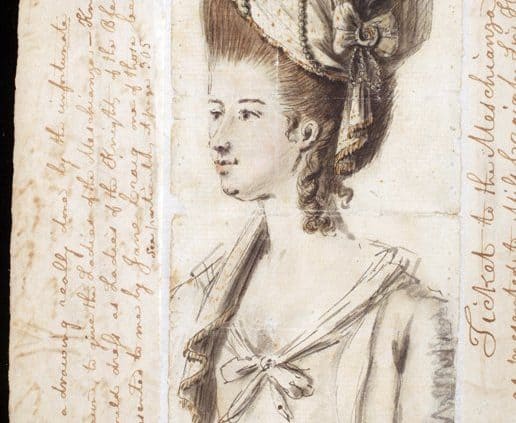Treasures at the Library Company of Philadelphia
During the winter of 1777-78, the American army starved and froze at Valley Forge, while the British enjoyed the comparative comforts of city quarters in Philadelphia. By spring the do-nothing policy of General Sir William Howe brought about his recall and the withdrawal of his troops.
On the eve of Howe’s departure, his officers staged an extravagant fête called the Meschianza in his honor. The affair began with a colorful regatta on the Delaware as the guests made their way to the estate of Joseph Wharton south of the city. There a mock tournament between the Knights of the Blended Rose and those of the Burning Mountain was followed by a ball, fireworks, and supper that lasted until four in the morning.
 The chief architect of the elaborate affair was Captain, later Major, John André. He designed the heraldic ticket of admission, probably engraved by James Smither, and the décor, as well as costumes for the Knights’ ladies. The costume drawing to the left was included in a manuscript of Philadelphia antiquarian John Fanning Watson’s popular Annals of Philadelphia.
The chief architect of the elaborate affair was Captain, later Major, John André. He designed the heraldic ticket of admission, probably engraved by James Smither, and the décor, as well as costumes for the Knights’ ladies. The costume drawing to the left was included in a manuscript of Philadelphia antiquarian John Fanning Watson’s popular Annals of Philadelphia.
Watson called the Meschianza “the most splendid pageant ever exhibited in our Country, if we except the Great Federal Procession … of 1788.” Describing the affair in detail in his 1830 history of the city, Watson relied on testimonials, prints, drawings, and paper and textile specimens accumulated in an extra-illustrated manuscript of his text that he presented to the Library Company the same year. The 300-page manuscript holds not only the costume sketch provided to Watson by attendee Miss Jane Craig, but also her first-hand account of the attire. As noted by Watson, Miss Craig clarified that the actual costume worn by the “Knights of the Blended Rose” ladies differed from the sketch and included headdresses “more towering than the  drawing.” Watson also acquired samples of the silk used in the dresses, first-hand descriptions of the chief British officers who attended, and a poem written by Quaker Hannah Griffitts in protest of the lavish event, calling it “A shameful scene of dissipation/The Death of sense and Reputation.”
drawing.” Watson also acquired samples of the silk used in the dresses, first-hand descriptions of the chief British officers who attended, and a poem written by Quaker Hannah Griffitts in protest of the lavish event, calling it “A shameful scene of dissipation/The Death of sense and Reputation.”
According to Watson, for the 50 young ladies from prominent Philadelphia families who attended the affair, “all umbrage was forgotten” when the Americans reoccupied the city several weeks later. Unlike the ladies, the unfortunate André suffered a different fate. A little over two years later on October 2, 1780, “the charm of the company” was hanged as a spy for his role in Benedict Arnold’s attempted surrender of West Point to the British.
Other artifacts related to the Meschianza held by the Library Company include a mirror from the ballroom of the Wharton estate, a ticket to the event, and silhouettes traced by André in 1778. The ticket was that sent to Becky Redman and is one of only two known to have survived. It was given to the Library Company with other Meschianza relics in 1900 by Mrs. John Meredith Read.




Leave a Reply
Want to join the discussion?Feel free to contribute!